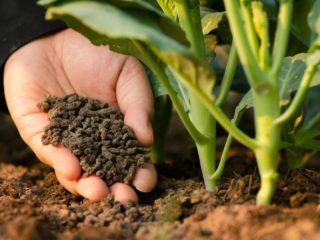
Nurturing Plants Naturally: Unveiling the Magic of Organic Soils and Fertilizers
The world of gardening and plant care is undergoing a remarkable revolution as more and more people are turning to organic methods of nurturing their plants. Organic soils and fertilizers have become the go-to choice for those who want to cultivate a healthy and sustainable garden without the use of harmful chemicals. These natural alternatives not only promote the well-being of plants, but also contribute to the preservation of our environment, making them a win-win solution for both gardeners and Mother Nature.
Organic soils, also referred to as "living soils," are the foundation of successful organic gardening. They are enriched with a myriad of beneficial microorganisms, such as bacteria, fungi, and earthworms, which work in harmony to create a balanced and nutrient-rich environment for plant roots. Unlike conventional soils, organic soils are free from synthetic pesticides and fertilizers, allowing plants to thrive naturally and develop stronger resistance to diseases and pests. But it’s not just the absence of harmful chemicals that sets these soils apart – they also possess the ability to enhance soil structure, improve water retention, and foster healthy root development, all of which are crucial for plant growth.
When it comes to the nutrient needs of plants, organic fertilizers offer a powerful alternative to their synthetic counterparts. Derived from natural sources such as compost, animal manures, or plant remains, these fertilizers supply plants with an array of essential nutrients in a slow-release form. This gradual breakdown ensures a continuous supply of nutrients over time, minimizing the risk of nutrient imbalances and reducing the potential for harmful runoff that can pollute our water sources. Furthermore, organic fertilizers contribute to the long-term health of the soil by improving its structure and increasing its ability to hold water, nutrients, and beneficial microorganisms. As a result, plants not only receive the nutrients they require, but the soil itself is rejuvenated and maintained for future planting seasons.
The world of organic gardening is teeming with the wonders of organic soils and fertilizers, offering a sustainable and environmentally friendly approach to plant care. Their ability to promote healthy growth, improve soil health, and contribute to ecological balance make them an invaluable tool for gardeners seeking a natural and responsible way to nurture their plants. So, join the organic gardening movement and take a step towards creating a thriving garden ecosystem that will benefit both you and the planet we call home.
Benefits of Organic Soils
Organic soils offer numerous benefits for plant growth and overall environmental health. These soils are rich in organic matter, which enhances soil structure and fertility. Organic matter serves as a source of nutrients and moisture retention, promoting healthy root development and reducing the need for excessive watering. Additionally, organic soils support beneficial soil organisms such as earthworms and microorganisms, which aid in nutrient cycling and improve soil health.
One of the key advantages of using organic soils is their ability to enhance plant resilience. Organic matter helps to create a favorable environment for beneficial microbes that protect plants from harmful pathogens and diseases. The presence of these microorganisms can help prevent the need for chemical pesticides, making organic soils a more sustainable and environmentally friendly choice.
Furthermore, organic soils contribute to long-term soil fertility. By using natural materials such as compost and decomposed plant matter, organic soils provide a balanced supply of nutrients to plants, ensuring their continuous growth and productivity. This reduces the reliance on synthetic fertilizers, which can have negative effects on soil health and water quality.
In summary, the use of organic soils offers multiple benefits, including improved soil structure, enhanced plant resilience, and long-term soil fertility. By adopting organic gardening practices and utilizing organic soils, we can create a healthier and more sustainable environment for both plants and people.
The Power of Organic Fertilizers
Organic fertilizers have gained immense popularity in recent years due to their numerous benefits for both plants and the environment. These fertilizers, derived from natural sources, provide essential nutrients to plants without the harmful chemicals found in synthetic alternatives.
One of the key advantages of organic fertilizers is their ability to improve soil health over time. Unlike synthetic fertilizers, which may cause soil degradation, organic fertilizers enrich the soil with organic matter, enhancing its structure, water-holding capacity, and nutrient-retention abilities. This creates a nurturing environment for plant roots, leading to healthier and more resilient plants.
Furthermore, organic fertilizers promote the growth of beneficial soil microorganisms. These microscopic creatures play a vital role in breaking down organic matter into nutrients that plants can readily absorb. By fostering a diverse and thriving soil ecosystem, organic fertilizers contribute to long-term soil fertility, reducing the need for constant application of fertilizers.
Beyond their impact on soil health, organic fertilizers also offer environmental benefits. Unlike synthetic options, which may leach harmful chemicals into water bodies, organic fertilizers pose minimal risk of water pollution. They ensure that nutrients are released slowly and in a balanced manner, reducing the likelihood of nutrient runoff and subsequent contamination of lakes, rivers, and groundwater.
In conclusion, organic fertilizers provide a natural and sustainable solution for nurturing plants. They not only nourish plants with essential nutrients but also revitalize the soil, support beneficial microorganisms, and minimize environmental harm. By harnessing the power of organic fertilizers, we can cultivate thriving gardens and contribute to a healthier planet.
Implementing Organic Practices

In order to cultivate healthy and thriving plants, it is essential to implement organic practices in your gardening routine. By adopting organic soils and fertilizers, you can create a sustainable and environmentally friendly garden. Let’s explore some key steps to effectively incorporate organic practices.
fall planting zone 9bChoosing Organic Soils:
One of the first steps towards nurturing plants naturally is selecting the right organic soils. Look for soil mixes that are labeled "organic" and ensure they are free from synthetic chemicals or pesticides. These organic soils are typically rich in natural nutrients and beneficial microorganisms, creating a favorable environment for plant growth.Composting for Nutrient-Rich Soil:
Composting is a vital practice to enrich the soil with organic matter. Start by collecting kitchen scraps, yard waste, and other biodegradable materials. These materials can be layered in a compost bin and allowed to decompose over time. Regularly turning the compost will help accelerate the breakdown process and distribute nutrients evenly. Once ready, this nutrient-rich compost can be added to the soil, improving its structure and fertility.Utilizing Organic Fertilizers:
When it comes to fertilizers, organic options are the way to go. Organic fertilizers are derived from natural sources such as animal manure, bone meal, or composted plant matter. These fertilizers provide a slow-release of nutrients, feeding plants gradually over time. They also help improve soil structure, moisture retention, and promote beneficial microbial activity. Follow the instructions on the packaging to ensure the correct application rates.
By implementing these organic practices, you can create a balanced and sustainable ecosystem in your garden. Organic soils and fertilizers not only nurture your plants, but also contribute to the overall health of the environment. Start incorporating these practices today and witness the magic of organic gardening firsthand. Happy gardening!



